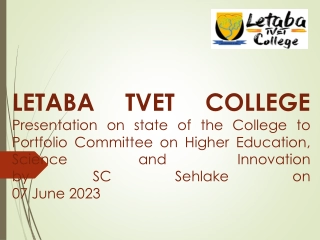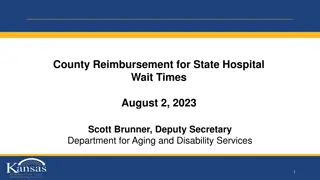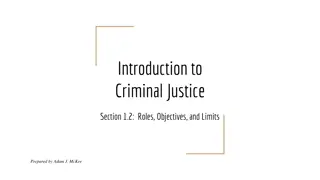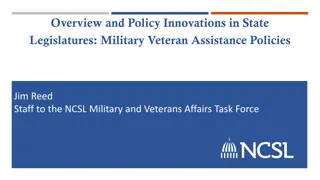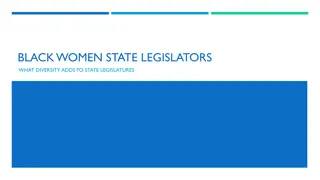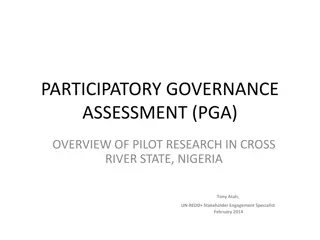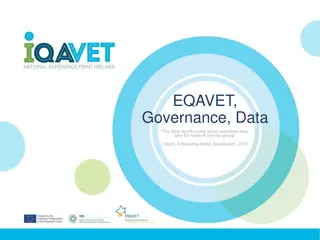State Legislatures and Governance: An Overview
National Conference of State Legislatures (NCSL) supports state legislators and staff, covering various policy areas and offering resources like research, training, and opportunities for idea exchange. State legislatures vary in size, session lengths, and rules. States are controlled by Republicans, Democrats, or are divided. Legislators prefer uncontested districts, with party shifts in some chambers.
Download Presentation

Please find below an Image/Link to download the presentation.
The content on the website is provided AS IS for your information and personal use only. It may not be sold, licensed, or shared on other websites without obtaining consent from the author.If you encounter any issues during the download, it is possible that the publisher has removed the file from their server.
You are allowed to download the files provided on this website for personal or commercial use, subject to the condition that they are used lawfully. All files are the property of their respective owners.
The content on the website is provided AS IS for your information and personal use only. It may not be sold, licensed, or shared on other websites without obtaining consent from the author.
E N D
Presentation Transcript
Strengthening States for 40 Years
National Conference of State Legislatures Bipartisan organization, funded by state legislatures Serves the 7,382 legislators and 30,000+ legislative staff of the nation's 50 states, its commonwealths and territories (and Scotland) Covers every topic of state policy State fiscal policy (appropriations and taxation) State legislative management Activities: Research and information on topics of interest to the states Technical assistance and training Opportunities for policymakers to exchange ideas Lobbying at the federal level for states' interests
Chambers vary in seats from 49 to 424 NH has 400 Legislative House Seats; 1 per 2000 voters AK has 20; 7 Ds and 13 Rs CA and TX Senate Districts are larger than Congressional Session length may be extremely short or virtually unlimited NM is 1 month CA, MN, WI, IL, MI, OH, PA, NY, NJ, MA Year Round MT, NV, ND, TX had no Regular Session in 2014 Each legislative chamber may determine its own rules of procedure Unlimited Bill Introduction (NY) Bills limited to certain topics; budgets (LA, NM)
State Governments: State Legislature and Governors Office 23 States are controlled by Republicans 15 States are controlled by Democrats 11 are Divided, with one party controlling at least one legislative chamber or the Governor's Office as of May 4, 2014
Legislators do not like contested districts - single party districts are more predictable Reapportionment following 2010 Census - More urban districts, fewer rural districts Moderate Republican losing Primaries; becoming more conservative overall Special Elections 2006 & 2008 went to Democrats 2010 went to Republicans 2012 5 to Democrats, 2 to Republicans 2014 Republican leaning; Democratic wins
Legislative Chambers that may Change Parties in 2014 AZ Senate AR House CO Sen & Hs IA Sen & House KY House ME Sen MI House NV Sen NH Sen (maybe Hs?) NY Sen (coalition situation) OR House & Sen PA Sen WA Sen (coalition situation) WV House WI Sen
Food Safety NCSL tracks food safety laws and legislation in all 50 states, Washington, DC, and Puerto Rico. Topics covered range from safe food handling practices to the production and sale of raw milk. The Agriculture and Rural Legislation Database contains legislation spanning the years 2009-2014. The database is readily accessible at : http://www.ncsl.org/issues-research/agri/agriculture-and- rural-development-legislation.aspx, and is updated regularly to ensure the availability of information on the most current legislative developments.
2014 Food Safety Legislation 445 bills introduced in 43 states 203 remain pending 171 bills have failed; 58 through Adjournment CA, MI, OH, NC, MA, DE, NJ, NY, MA and RI are still in session as of June Montana, Nevada, North Dakota and Texas did not hold a session in 2014 49 Bills in 23 States have been enacted; 10 resolutions in 5 states have been adopted Another 6 await Governor s signature 3 have been vetoed
Legislative Highlights Food Safety 42 bills in 13 states; 8 enacted Food Safety Modernization Act 10 bills in 4 states; 1 enacted Cottage Foods --18 bills introduced in 9 states. Seafood and Fish -- 35 bills introduced; 8 enacted Food Labeling -- 114 bills introduced in 31 states; 14 enacted Milk and Raw Milk -- 54 bills introduced in 26 states; 4 enacted. Meat -- 24 bills introduced in 12 states; 5 enacted
Food Safety Legislation Prior to 2014 2013 - 169 bills introduced in 37 states: Arizona (2), California (7), Colorado (1), Connecticut (5), Delaware (1), Florida (8), Georgia (2), Hawaii (37), Iowa (3), Illinois (7), Indiana (6), Kansas (1), Massachusetts (6), Maryland (2), Maine (5), Minnesota (4), Missouri (1), Mississippi (5), Montana (5), North Dakota (1), Nebraska (1), New Jersey (3), New Mexico (2), Nevada (1), New York (25), Oklahoma (4), Oregon (3), Rhode Island (2), South Carolina (1), Tennessee (3), Texas (1), Utah (1), Virginia (1), Vermont (3), Washington (4), West Virginia (3), and Wyoming (2). 58 laws passed in 29 states 2012: 53 bills introduced in 24 states: California (1), Colorado (2), Georgia (2), Hawaii (4), Illinois (5), Indiana (1), Iowa (1), Massachusetts (1), Maryland (2), Michigan (1), Minnesota (2), New Hampshire (1), New Jersey (5), New Mexico (1), New York (2), Oklahoma (3), Oregon (2), South Carolina (3), Tennessee (3), Utah (1), Vermont (1), Virginia (3), Washington (1), and West Virginia (1). 9 laws passed in 8 states: Colorado (1), Hawaii (1), Illinois (2), Indiana (1), Minnesota (1), Tennessee (1), Vermont (1), and Washington (1). 2011: 30 proposed in 16 states: Arkansas (1), Arizona (1), Colorado (1), Georgia (2), Hawaii (3), Illinois (3), Minnesota (2), Montana (1), New Jersey (2), Oklahoma (1), Tennessee (2), Texas (2), Utah (1), Virginia (5), Washington (1), and Wyoming (2) Thirteen laws passed in 11 states: Arkansas (1), Arizona (1), Hawaii (1), Illinois (1), Minnesota (1), Montana (1), Tennessee (1), Texas (1), Virginia (3), Washington (1), and Wyoming (1). 2010: 22 bills proposed in 13 states: California (1), Connecticut (2), Florida (2), Iowa (1), Kansas (1), Maryland (3), Maine (1), Michigan (3), Nebraska (1), Oklahoma (1), Tennessee (2), Virginia (3), and Wisconsin (1). Eight laws passed in six states: Connecticut (1), Kansas (1), Maine (1), Michigan (2), Virginia (2), and Wisconsin (1).
Food Safety Laws 2014 AZ H 2436 (Act 210) requires food handler certification meets accreditation criteria CA A 224 (Act 404) requires producers of whole produce, shell eggs or processed foods from a community-supported agricultural program to comply with food safety requirements CA A 1252 (Act 556) revises the food handling code to require handwashing when changing gloves; prohibits persons with open wounds working with food HI S 326 (Act 106) creates task force on food safety guidelines for locally- farmed products LA SCR 94 implements a Farm to School Program to assist schools in procurement of fresh fruits, vegetables, meats and seafoods MN S 2060 (Act 163) relates to farmers markets; food safety standards TN S 172 (Act 182) enacts the Tennessee retail Food Safety Act UT H 176 (Act 327) amends the health code related to food handler permits and food safety managers; exempts events hosted by charitable organizations
Food Safety Modernization Act HI H 279 (failed) recommends methods to prepare for compliance with FSMA ID HJM 5 (failed) urges FDA to suspend imposition of FSMA MI H 5336 (pending) prohibits federal regulation o f food and food producers in the state NH H 1221, 1270, 1273, 1464, 1582, 1583 (failed) declares meat; dairy; ag products; poultry; apian products produced in the state exempt from FDA FSMA requirements ID HJM 7 (adopted) opposes the adoption of any water quality std under FSMA; urges the FDA to suspend rules to implement FSMA UT HB 365 (2011) Made it a felony for feds to enforce FSMA in state; State Legislative Attorney stated it was unconstitutional
Cottage Foods "Cottage Foods" refers to foods prepared in a producer's home kitchen for sale to consumers. Producers usually sell directly to consumers out of their homes or at farmer's markets. Permit sale of non-hazardous foods without state oversight if labeled. States have consistently introduced cottage foods legislation since 2009.
Cottage Foods 22 states permit certain exemptions for small-based food production; mostly for non-hazardous foods 18 bills in 9 States AL S 159 (Act 180) exempts certain baked goods and candies; requires completion of food safety course CA A 1252 (Act 556) has language on cottage food operations HI SCR 97 (adopted) creates a cottage food business workgroup of DoH and Industry Representatives IL H 5657 (at Gov) addresses labeling of cottage foods ME S 444 (vetoed) exempts homestead foods and raw milk MO S 525 (at Gov) exempts cottage food operations VA S 176; H 135 (failed) would include seafood as a Cottage Food
Meat and Poultry IL S 1470 authorizes the inspection of any establishment with adulterated or misbranded meat food product IN S 179 allow poultry farms to slaughter & process limited amount of poultry without inspections under federal regulations; exempts eggs producers from local regs ME H 179 exempts certain poultry producers from state inspection requirements; requires labeling ME H 587 requires mobile poultry processing operations be licensed by state; permits uninspected poultry to be sold to locally- owned restaurants and grocers NH H 608 allows the sale of uninspected poultry and rabbits to restaurants OK H 1999 - prohibits the sale or possession of horse meat for human consumption No bills on Pink Slime introduced in 2014
Seafood and Fish Labeling of Seafood and Fish Bills introduced in AL, HI, MD, MA, PA, SC and WA WA H 1200 (Act 290) creates system for food fish and shellfish labeling
RoadKill Meat CA, TN, TX and WA prohibit the taking of roadkill for human consumption 19 States allow for Human Comsumption of RoadKill AK allows the donation of meat to shelters, but not for personal consumption. (they don t want you be hunting by truck) FL requires no permit or check-in: You hit it, you keep it. GA wants you to report a bear but not a deer. In VT, beavers are free, but you ve got to get a permit to keep a deer. MT requires the carcass be processed at home or in slaughterhouse. IL it is illegal to wantonly waste usable meat (Act. No. 183, 2014).
Raw Milk Raw milk is milk that has not undergone pasteurization or other processing to eliminate pathogens. The FDA maintains that raw milk is not safe to consume, however some states have passed legislation to allow the sale of raw milk to consumers. Demand for Raw Milk products is growing
Raw Milk 64 bills relate to raw milk introduced in KS, LA, MA, MD, ME, MI, NC, NE, NJ, NY, OK, RI, UT, VT, SD, WI and WV CA A 1390 (Act 107) exempts goat milk from pasteurization IL S 3157 (at Gov) includes milk from sheep, water buffalo and other hooved mammals ME S 444 (vetoed) exempts homestead foods and raw milk NE L 67 amends state milk act UT SJR (adopted) studies private sales of raw milk
Fruits and Vegetables CA S 504 (Act 254) quality standards for fruits, nuts and vegetables MS H 1328 (enacted) provides loans to healthy food retailers to increase fresh fruits and vegetables VT H 869 (Act 159) promotes locally-grown fruits and vegetables
Any state public health director who is not fired within 3 years is not worthy of their job. former director Dr. Bill Schmidt, MO
Doug Farquhar, J.D. National Conference of State Legislatures Doug.farquhar@ncsl.org


